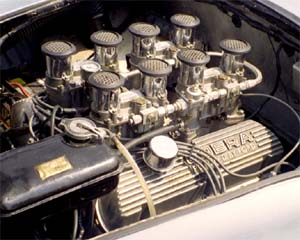Any differences will be simply in engine build, IE compression ratio, intake n carb, cam, headers, AND HEADER OUTLET
EXAMPLE take a good hi comp. engine with some "thump" in the cam, and remove the intake, install an intake using individual carbs for each cylinder, like on a Cobra/ Weber 4 x 2 bbl setup - 1 bbl for each cylinder.
Like so
or Glenn Bunch's hemi
This one change will COMPLETELY change the sound and characteristics of the engine. Same deal with the old Hilborn, etc stack type injection setups.
(Did you know that the older 289/302/ 390/ etc Fords ACTUALLY HAVE the same firing order as GM/ Mopar? It's all in the numbering of the cylinders)
Headers with torque extensions, especially when brought out to the side make a car sound MUCH different.
I can remember at Miramar, someone had an old Tempest --the early one originally with rear transaxle ---
He'd put in a Chiv 350 with big Holley 2BB and velocity stacks on the 2bbl, and a weird set of homemade headers. I don't think they even had collectors
WHEN YOU REVVED THAT THING UP it had a sort of "scream" like an Indy engine!!!!
A friend removed that engine, installed in a 66 Chevelle with conventional chassis headers, and swapped the intake for a Edelbrock 4bbl and big holley AND IT SUDDENLY SOUNDED like "any other" built V8
I once won a sizeable bet because of a 426 Dodge. My friend says "yep, YA KIN ALWAYS TELL the sound o' them HEMIS"
I bet him 40 bucks, "not a hemi." I KNEW what was in the car.
So later we went to the pits. "That the car?" "YUP." 426 wedge. Pay up, pal.
I used to hang out with a guy "who could tell" a BB from a SB "just by listening." Well we'd just got through swapping a 440 into my friends 74 Dodge 4x4 shortie, for the factory 360. Both had dual exhaust and mild cams. THEY SOUNDED EXACTLY THE SAME at low idle and low street speeds, and my friend HAD SAID SO.
I pointed out this statement he'd made, so THEN he tried to tell me "well I can tell on FORDS"
I'm tellin ya. You CANNOT tell.
Even my mild lo comp. 360 has a little solid tappet camshaft. I've had a couple of guys "YOU have a BIG BLOCK in that??"


















